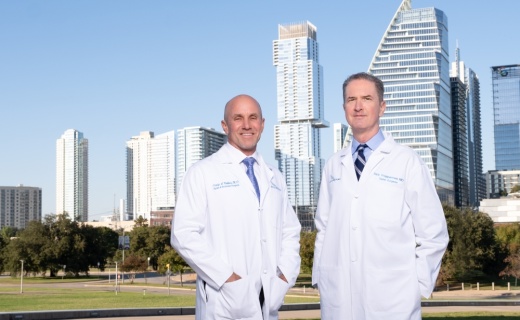Dr. Craig Kuhns and Dr. Rick Wupperman provide care for everything from neck pain to complex spinal conditions such as major curvatures, spinal trauma and degenerative spine conditions. The practice is located at 3000 N. Interstate Hwy 35, Ste. 708, Austin and is affiliated with St. David’s Medical Center. Although the practice is located in Austin, Dr. Kuhns and Dr. Wupperman treat patients from across the state.
Complex spine care involves treating multiple levels of the spine and a longer recovery time for the patient.
“[Spinal] deformity care is complex by virtue of requiring things like osteotomy, where you cut away excess bone or excess tissue to realign the spine with screws, rods and spacers,” Dr. Wupperman said.
Dr. Wupperman said Austin Spine stands out as one of the few practices in the area to offer this kind of care.
“There aren't many people in town who do complex spine care, deformities and spine surgery because they are longer, more difficult operations,” Dr. Wupperman said. “[These operations] take more planning and more long-term follow up.”
Because of the intricacy of these procedures, it’s important to see an expert surgeon. The doctors at Austin Spine have over 30 years of experience in complex spine care.
“We both did complex spine fellowships,” Dr. Wupperman said. “Pretty much every orthopedic surgeon does some sort of spine fellowship, but not all do complex spine fellowships.”
In addition to their fellowship experience, both doctors participate in regular meetings with other physicians to discuss complex spinal treatments and Dr. Kuhns is a member of the scoliosis research society.
Both doctors are also trained to perform minimally invasive spinal surgeries. This method of spine surgery involves making multiple small incisions instead of one large incision.
“If applicable, we can do minimally invasive deformity [surgeries], which means less blood loss, faster recoveries, less pain, less narcotic use, shorter hospital stays, and hopefully better ultimate outcomes,” Dr. Wupperman said.
Another aspect of the practice that sets it apart is its use of the newest model of the EOSedge X ray system.
“It can do full-body X rays in 30 seconds with one-sixth of the radiation of normal X ray machines with excellent quality images,” Dr. Wupperman said. “It also uses artificial intelligence to measure angles [of the spine].”
Often with spinal deformities other parts of the body like the hips or knees will try to compensate for the misalignment. Having high-quality images of the whole body helps the doctors at Austin Spine plan the most effective treatments for their patients.
“Sometimes people have really complex deformities, and it's hard to see where the end plates of the vertebrae are,” Dr. Wupperman said. “The newer system has better clarity so there’s less chance for a measurement error. [The new system] allows for more accurate, detailed and faster planning.”
Austin Spine’s fellowship-trained physicians do spine, and only spine, and are experienced in providing expert spine care to even the most complex patients.
To learn more about Austin Spine, visit the practice’s website.
The above story was produced by Multi-platform Journalist Mary Katherine Shapiro with Community Impact's Storytelling team with information solely provided by the local business as part of their "sponsored content" purchase through our advertising team.






